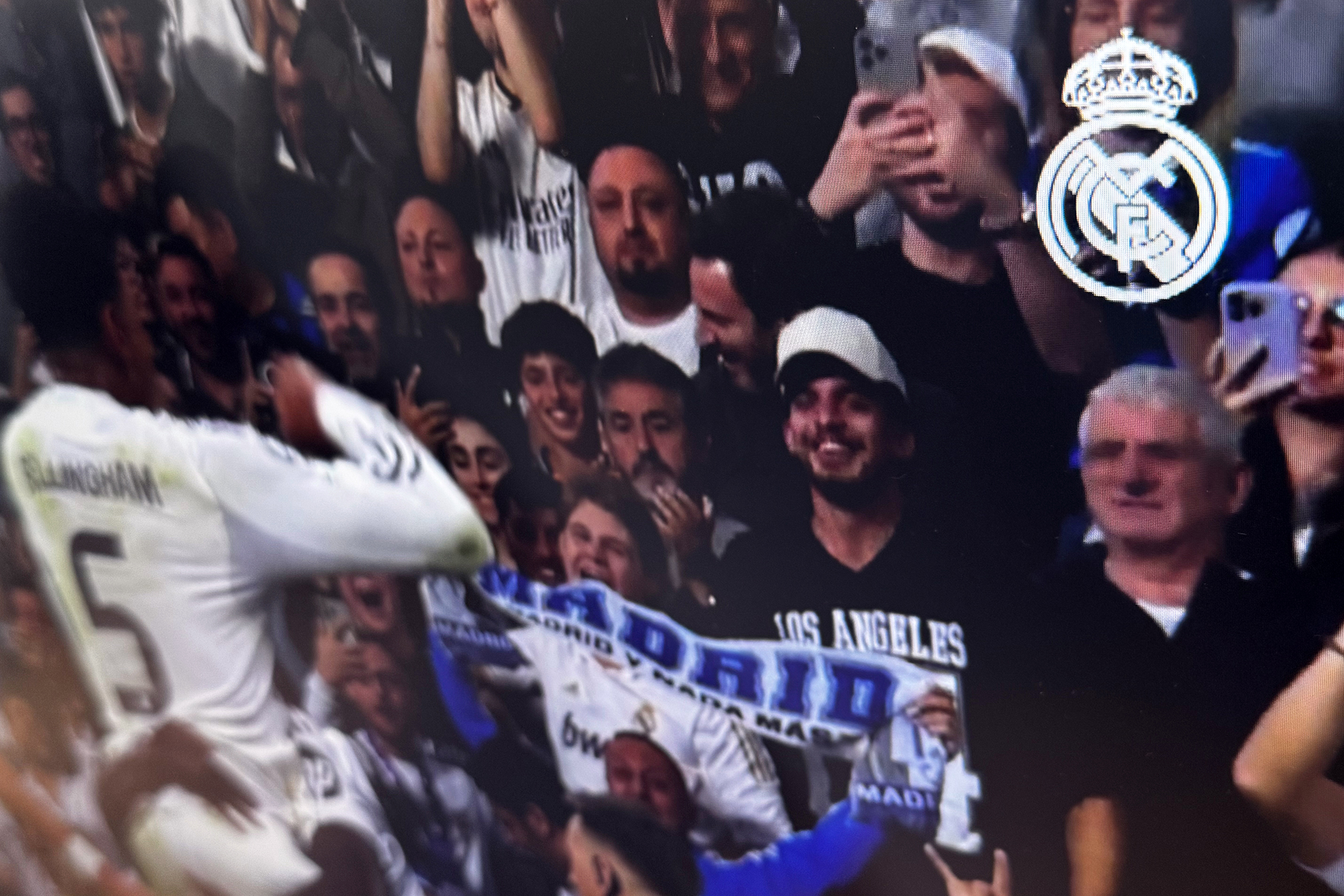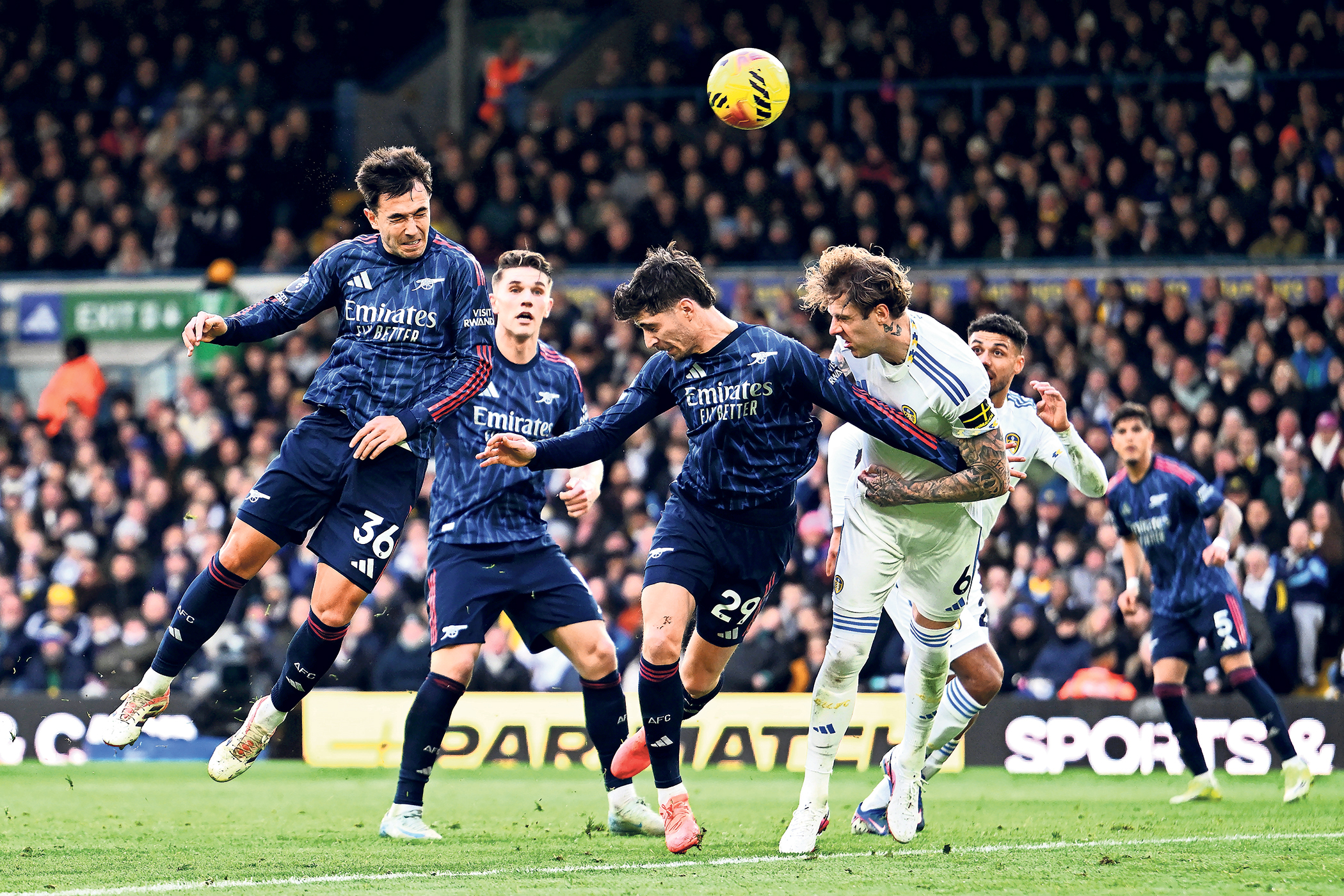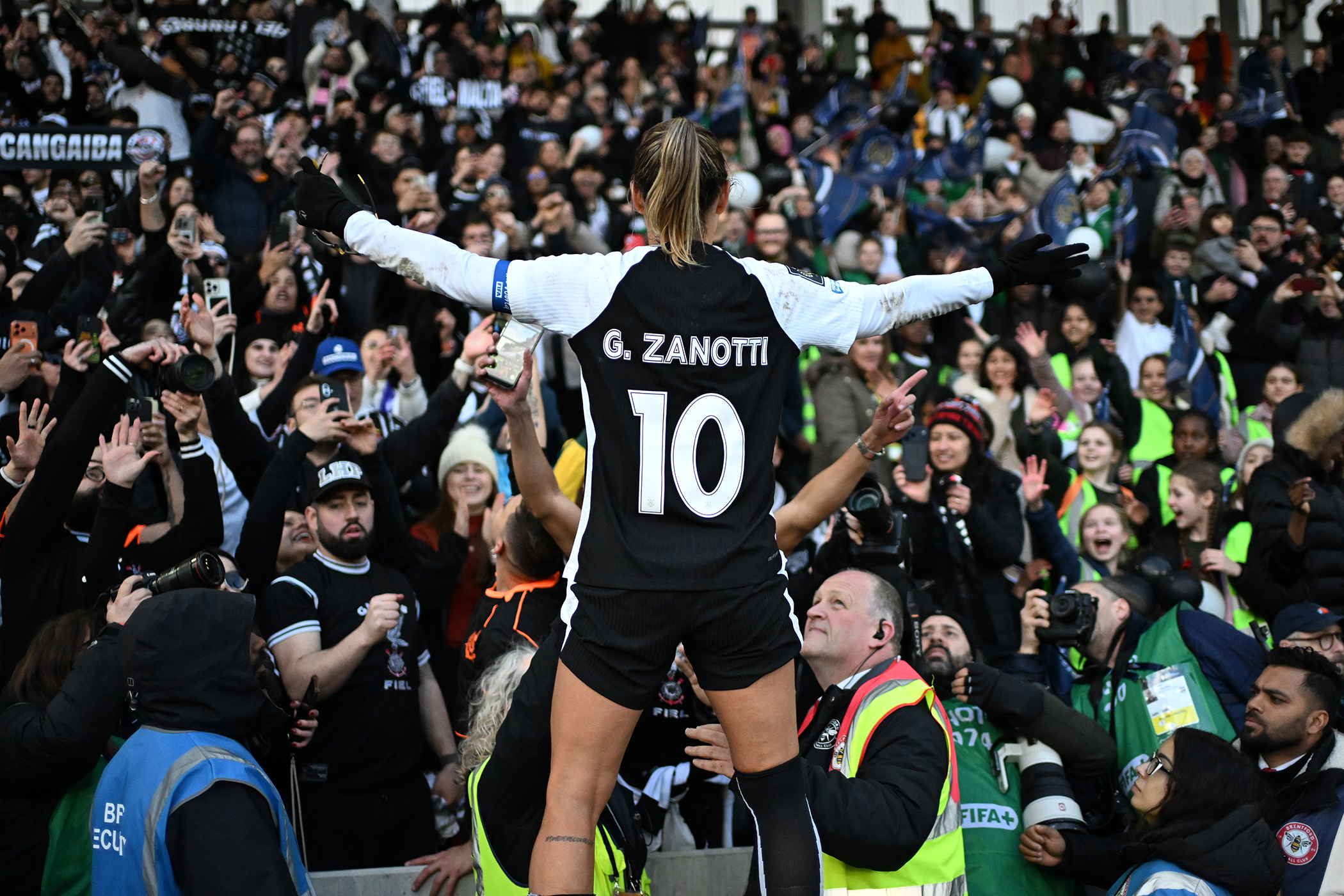Just occasionally, in the course of watching the output of Real Madrid’s in-house television station, it is necessary to pause, rewind and try to work out how exactly the conversation moved from Point A to a point that is not just some distance further down the alphabet, but is so far removed from its source that it may as well come from an entirely different script.
For example: 50 minutes or so into Thursday’s edition of Real Madrid Conecta, a glossy, almost daily news show that lasts more than 90 minutes and also incorporates a quiz, the host Cristina Gullón moved the discussion away from forensic scrutiny of the club’s 1-0 win in the Champions League against Juventus the previous night and onto the coming weekend’s visit of Barcelona for the first Clásico of the season.
This should be, she suggested to her guests, a particularly compelling instalment of the world’s most rampantly marketed game: Real and Barcelona currently sit, after all, first and second, respectively, in La Liga. Jesús Bengoechea – as close to an independent observer as the channel will allow, in that he is not directly employed by Real Madrid – agreed. The two sides, he felt, were closely matched, the game finely balanced.
Sitting across the studio, his counterpart Miguel Ángel Muñoz had no intention of standing for this misleading rage-bait. “Look at the game Barcelona played in Mallorca,” he said. “Look at their game in Vallecas.” (Barcelona won the first one, 3-0, and drew the second. Both were in August. This does not feel like a very convincing argument.) “They are not close at all.”
All of this, of course, is pretty standard fare for a club television station. Nobody watches the in-house channels of Manchester United or Liverpool for their clear-eyed, dispassionate analysis of the teams they cover. They do not exist to hold truth to power. The clue is in the name, really. It is not reasonable to expect Real Madrid TV to be an impartial news source.
What makes it unusual, though, is what follows. Within a couple of minutes, as an endless loop of Real goals in recent Clásicos plays on a split screen, Muñoz has pivoted on to different territory entirely, relitigating a game between Barcelona and Eibar from 2017 and the “scandalous” decisions of the referee who officiated it . He drifts into something that might, to a less enlightened audience, sound like conspiracism.
When you look at the images, the errors do not seem so much just like errors, he concludes, with the air of a man telling us all we should do our own research.
This is not, I think, the sort of stuff you get on MUTV.
Related articles:
The Russian-American writer Gary Shteyngart has twice made himself the subject of a not especially scientific experiment. In 2014-15, he spent seven days cloistered in a hotel room – leaving only for a daily swim – watching nothing but Russian state television. In 2023, the year after Russia’s invasion of Ukraine, he did it again, this time for The Atlantic.
On both occasions, Shteyngart’s experiences could have been described as harrowing if they had not taken place in the sorts of hotels you only get on American expense accounts. His first attempt left him “psychologically compromised and barely sure of what constituted reality”. Four days into his second, he wrote: “There is a sadness to watching this much Russian television. I have started drinking earlier and have switched from pisco sours to vodka martinis. A part of me wants to die.”
Newsletters
Choose the newsletters you want to receive
View more
For information about how The Observer protects your data, read our Privacy Policy
The point of the exercise was not simply to try to understand the effect consuming the unmediated world view of Vladimir Putin would have on Russian viewers; it was to illustrate the way in which the media we consume constructs our understanding of reality.
The same principle, of course, applies closer to home; the effect would doubtless be the same for the audiences of Fox News and Newsmax (among a litany of others) in the United States and their George-at-Asda cousin here, GB News. And, in a different sphere of existence, it applies just as well to Real Madrid TV.
In its original form, the channel was no different from the rest of football’s 24-hour in-house broadcasters. Initially, it was a franchise, operated by Prisa, the Spanish media group that also owns the newspaper El País and the radio network Cadena SER. It broadcast soft-soap discussion shows, offered news bulletins, filled the long days with archival footage and reruns of youth team games to its audience of 60,000 or so subscribers, largely in Spain.
That changed when Florentino Pérez was elected as the club’s president in 2000. Pérez saw the channel as something much more significant than a way to make a few hundred thousand euros from the club’s most dedicated fans. To him, Real Madrid TV was a way to project his vision of Madridismo to the country and, through its international, English-language sister station, the world. It was, as one former executive said, his “loudspeaker”.
That vision was an airbrushed, Disney-fied version of reality. From 2003, when he brought the channel fully into the club’s fold, it ceased to show repeats of games in which Real Madrid had lost. Frequently, it will not show draws, either. “You watch, Real Madrid never loses on its own channel,” the former executive said. The station’s slogan is Abierto a nuevas emociones – open to new emotions. This does not, it appears, extend to “disappointment”.
According to other former employees, highlights are generally edited not just to accentuate Real’s performances,but to remove bad tackles or images of the club’s players spitting. In commentary, the club very rarely pick up so much as a booking that can be justified.
According to former employees, highlights are edited to remove bad tackles or Real players spitting
According to former employees, highlights are edited to remove bad tackles or Real players spitting
Much of that feels cynical, perhaps a little puerile, but it is basically pretty harmless; there are plenty of fans of plenty of teams who do not believe any of their players have ever deservedly been booked.
In recent years, though, the channel has taken a more drastic turn, one that has seemed to move it away from its place as just another airbrushed marketing device into something that has come to feel much more pernicious. One of the staples of the station’s output, in recent years, has been the analysis of referees appointed to officiate the club’s games, the channel’s guests poring over their mistakes and suggesting apparent biases. The club have been producing them for years but, purely subjectively, it feels as though they have become more pointed in light of the Negreira scandal, in which Barcelona were linked to payments to one of the officials in charge of refereeing appointments.
The effect is undeniably toxic. Before last season’s Copa del Rey final, the game’s referee, Ricardo de Burgos Bengoetxea, broke down in tears as he described how his son had come home crying after being told at school that his father was “a thief” after a Madrid video about his previous officiating.
It is likely not to be unrelated that La Liga would only announce the referee for today’s Clásico yesterday evening. That might reduce the pressure, but it will not eliminate it entirely. In the absence of a name, as Muñoz demonstrated, the channel is perfectly happy to rail against referees in general.
Over the past week or so, I have done my best to repeat Shteyngart’s experiment. Not, admittedly, under the same laboratory conditions: nobody was volunteering to put me in the sort of hotel that has bathrobes for a start. Also I have two young children, an attention-seeking spaniel and a variety of professional commitments. Doing literally nothing except watching Real Madrid’s in-house television channel was not an option.
But still, in the build-up to this weekend’s Clásico, I have tuned into the channel more often than all but the most devoted Madridista should.
The effect, I can confirm, has not been as pronounced as Shteyngart found. Much of Real Madrid TV’s output is unremarkable: goal montages set to stirring music; endless replays of various Champions League finals; hour upon hour of build-up to the Juventus game, much of which focused – a little weirdly – on the fact that football is played on grass. “The grass is in place at the temple of Madridismo,” one reporter said on Wednesday morning. “In a few hours, the players will be on the grass,” another said that afternoon.
This is not especially compelling or controversial viewing. There is a reason Real Madrid TV does not garner much of an audience. Although the channel is included in Spain’s equivalent of Freeview, it is generally regarded as the least popular of the national networks. Last Saturday it had the lowest audience share of any of its peers. Its most popular broadcast was a showing of the western Dead Men. Its original programming attracted a high of 37,000 viewers.
Watching it, and speaking to those who have worked on it, though, it became clear that it is not meant to function like the Russian channels Shteyngart watched; it is not designed to pummel viewers into submission. It is much more surgical.
This week, its presenters took any chance they could to criticise Javier Tebas, the president of La Liga, over his now-aborted plan to take a game to the United States. Pérez loathes Tebas, and he wants to make sure Real Madrid’s voting socios – the club members to whom Pérez is theoretically accountable and who, presumably, comprise the small audience – do, too.
That is what Real Madrid TV is designed to do: to get the message to the people who, as far as the club can see, need to hear it. That only a few thousand see the referee videos does not matter; what matters is that they are picked up and pored over with great seriousness by more popular, Madrid-adjacent platforms like the television show El Chiringuito. Real Madrid TV is not just trying to construct reality for the people watching it. The idea is to shape it for everyone else, too.



